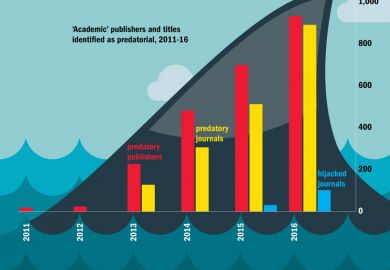Editors of academic journals should be investigated for “professional negligence” if peer review at their publications takes too long, says a leading critic of the scholarly publishing industry.
Despite many editors being unpaid or poorly remunerated for their work, plant scientist Jaime A. Teixeira da Silva believes they “should be held accountable” if authors are made to wait for an “excessive or unreasonable amount of time” before a decision is made on their research.
Writing in Publishing Research Quarterly, Dr Teixeira da Silva, formerly of Japan’s Kagawa University, says keeping authors in limbo for months or even years causes great stress to academics and damages their careers by delaying publication.
However, editors face little accountability, censure or punishment for subjecting scholars to unnecessary delays, says the paper, written with Judit Dobranszki, from Hungary’s University of Debrecen, titled “Excessively long editorial decisions and excessively long publication times by journals: causes, risks, consequences and proposed solutions”.
Studies show that peer review had taken as long as three years, while, in some extreme cases, authors had waited up to eight years after their manuscripts were accepted to see their work published, the paper says.
Peer review involving original research should take no longer than five to eight months and initial proposals to editors should be answered within two weeks, suggest the two scholars.
Journals should clearly state when authors should expect feedback and publishers should “pressurise peers to respect deadlines…and blacklist those peers who…exceed deadlines”, say the authors.
In the case of “exceptional delays”, unless “formal and sincere apologies” are offered to the authors, editors should be “removed from the editor board or even [face] an ethical inquiry at the editor’s research institute”, they recommend.
“Victims of a lack of professionalism” who face long delays should also be “offered additional rights, including the right of challenge or the right to suggest the formal removal of an editor from their post, without fear of retribution or retaliation”, they add.
The paper follows several run-ins between Dr Teixeira da Silva and publishers over his claims they had unnecessarily delayed publication of his work. He was banned from submitting work to journals published by Taylor & Francis in 2015 over “continuing challenges” to their procedures, as well as “inflammatory language”, according to the Retraction Watch website.
Speaking to Times Higher Education, Dr Teixeira da Silva explained his frustration at publishing delays, particularly when papers had already been accepted for publication.
For instance, a journal paper he had written about Donald Trump remained unpublished, despite being accepted by an online journal well before the US election, he said.
However, he acknowledged that the disciplinary approaches laid out in his article may backfire if they alienate academics from accepting peer review posts, which are largely unpaid.
Instead, more root-and-branch change was needed to make publishing more professional, which might include paying peer reviewers, he suggested.
“Banning, reprimanding, cutting and punishing [would] lead, ultimately, to a sense of bad feeling and bitterness, at least by one party,” he said, adding “you cut your peer pool by eliminating potentially important peers”.
Register to continue
Why register?
- Registration is free and only takes a moment
- Once registered, you can read 3 articles a month
- Sign up for our newsletter
Subscribe
Or subscribe for unlimited access to:
- Unlimited access to news, views, insights & reviews
- Digital editions
- Digital access to THE’s university and college rankings analysis
Already registered or a current subscriber?









